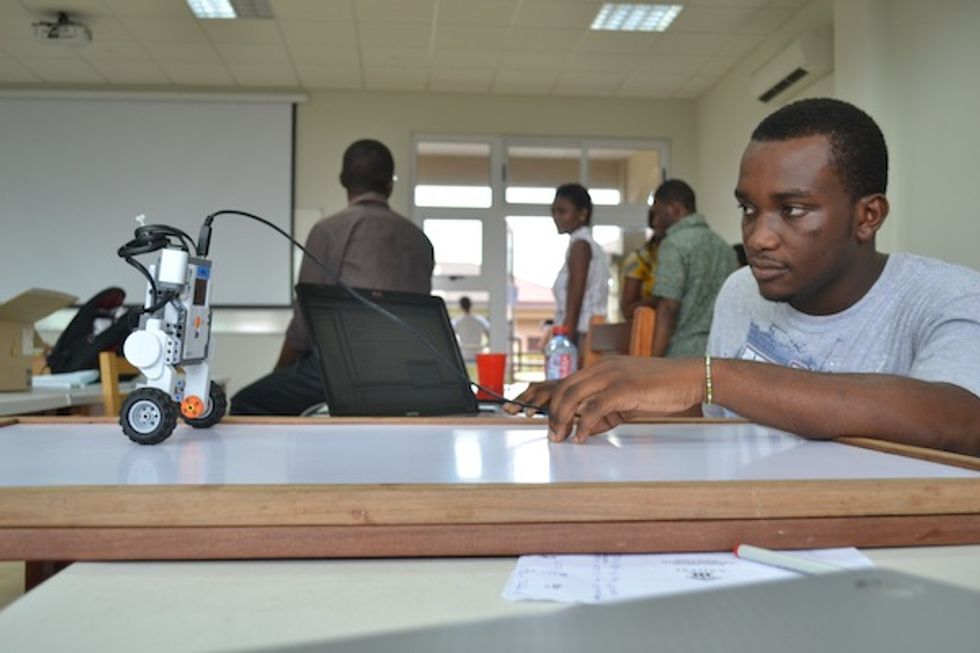A student programs a LEGO Mindstorms robot during a class at Ashesi University in Ghana.
Abibiman mma a wɔn anigye robot ho, yɛnkambom!
That's how you say, "African robot enthusiasts unite!" in Twi, one the main native languages in Ghana, a vibrant nation of 25 million people in West Africa.
Roboticists there and in the United States are launching today an initiative to enhance robotics education, research, and industry in Africa. The African Robotics Network (AFRON) wants to mobilize a community of institutions and individuals working on robotics-related areas, strengthening communication and collaboration among them.
"There are many robotics activities emerging in Africa," says Ayorkor Korsah, a professor of computer science at Ashesi University, in Berekuso, a 45-minute drive north of Accra, Ghana's capital. "Our goal is to highlight, enhance, and provide support for efforts in different parts of the continent."
Korsah co-founded AFRON with Ken Goldberg, an IEEE Fellow and professor of robotics at the University of California, Berkeley. Goldberg, who was born in Nigeria, where his parents were teachers, says one of the first projects AFRON is planning involves an international competition to design an extremely low-cost programmable robot for education.
The idea, still under development, is to create a simple robot with parts costing under $10 dollars that students would use to explore science and engineering topics. The robot would be connected via USB to a computer, and students would use open source software to program the robot's behavior and share their results.
Goldberg acknowledges that developing a capable robot for just $10 is a challenge. "We want to get people thinking creatively," he says. "We are not sure it's possible, but it's a target to aim for." If they're successful, robots could become a powerful—and popular—educational tool in Africa.
"Robotics is a great educational tool because it combines the tangible world, with which kids are familiar, and the formalization of programming and mathematics," says Paulo Blikstein, a professor at Stanford's School of Education who studies the use of technology in classrooms and is not involved with AFRON. "So you get the best of both worlds, if it is done right."
AFRON, whose advisory board includes luminaries such as Tim O'Reilly and Dale Dougherty, co-founders of O'Reilly Media and Make Magazine, will announce more details about the robot design competition, including criteria, jury, and prize, next month.
Korsah [above, center, with her students] grew up in Nigeria and Ghana, and went on to study in the United States, earning a bachelor's and master's degrees from Dartmouth College and a Ph.D. in robotics and artificial intelligence from Carnegie Mellon University. She's now an assistant professor at Ashesi, a university founded by Patrick Awuah, a former Microsoft executive who returned to his native Ghana to establish a liberal arts college that he hoped would educate a new generation of African leaders.
Korsah says AFRON was inspired by other robotics initiatives such as the European Robotics Network (EURON), but while most networks have concentrated on research activities, AFRON focuses more broadly on education, research, and industry, including efforts aimed at exposing school children to robotics.
Research labs, non-profit organizations, companies, and individuals may join AFRON for free: there are no dues. Already AFRON has members from South Africa and Nigeria, and affiliated membership is open to anyone worldwide.
Goldberg, a member of IEEE Spectrum's editorial advisory board, says the plan is to organize projects, meetings, and events in Africa and at robotics and automation conferences abroad. He adds that, for the purposes of AFRON, "robotics" is broadly defined to include related areas such as automation, computer vision, signal processing, machine learning, mobile games, and other topics.
"The idea is to build bridges, connect people with commons interests, and identify resources that can be shared," he says. "We've already made progress within Ghana and are excited to reach across Africa and to include members in other countries."
Images: Ayorkor Korsah/Ashesi University
Erico Guizzo is the director of digital innovation at IEEE Spectrum, and cofounder of the IEEE Robots Guide, an award-winning interactive site about robotics. He oversees the operation, integration, and new feature development for all digital properties and platforms, including the Spectrum website, newsletters, CMS, editorial workflow systems, and analytics and AI tools. An IEEE Member, he is an electrical engineer by training and has a master’s degree in science writing from MIT.




